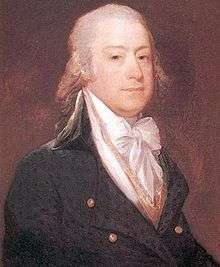William Loughton Smith
| William Loughton Smith | |
|---|---|
 | |
| 3rd United States Minister to Portugal | |
|
In office July 10, 1797 – September 9, 1801 | |
| Preceded by | John Quincy Adams (1796) |
| Succeeded by | Thomas Sumter, Jr. (1809) |
| Member of the U.S. House of Representatives from South Carolina's 1st district | |
|
In office March 4, 1789 – July 10, 1797 | |
| Preceded by | Position established |
| Succeeded by | Thomas Pinckney |
| 2nd Chairman of the House Committee of Ways and Means | |
|
In office December 21, 1795 – July 10, 1797 | |
| Preceded by | Himself |
| Succeeded by | Robert Goodloe Harper |
|
In office March 26, 1794 – November 3, 1794 as Chairman of the Standing Committee of Ways and Means | |
| Preceded by | Thomas Fitzsimons |
| Succeeded by | Himself |
| Personal details | |
| Born | 1758 |
| Died |
December 19, 1812 (aged 53–54) Charleston, South Carolina |
| Political party | Pro-Administration |
| Other political affiliations | Federalist |
William Loughton Smith (1758 – December 19, 1812) was an American lawyer from Charleston, South Carolina. He represented South Carolina in the U.S. House from 1789 until 1797. As chairman of the Committee on Ways and Means, Smith acted as a Federalist floor leader and was known as a close collaborator and House spokesman for Treasury Secretary Alexander Hamilton. In a special session of United States Congress called by John Adams in 1797, Smith introduced ten resolutions calling for increased naval defense and shore fortifications in response to the growing crisis in Franco-American relations.[1] He subsequently served as the U.S. Minister (ambassador) to Portugal 1797–1801.
Smith was opposed to the emancipation of slaves, believing it would benefit neither whites nor blacks. As he explained on the floor of the House of Representatives on March 17, 1790:
""If the blacks did not intermarry with the whites, they would remain black until the end of time; for it was not contended that liberating them would whitewash them; if they did intermarry with the whites, then the white race would be extinct, and the American people would all be of mulatto breed. In whatever light, therefore, the subject was viewed, the folly of emancipation was manifest."
References
- ↑ DeConde, Alexander (1966). The Quasi-War: The Politics and Diplomacy of the Undeclared War with France, 1797-1801. New York: Charles Scribner's Sons. p. 31.
External links
| United States House of Representatives | ||
|---|---|---|
| Preceded by Position established |
Member of the U.S. House of Representatives from South Carolina's 1st congressional district 1789–1797 |
Succeeded by Thomas Pinckney |
| Diplomatic posts | ||
| Preceded by John Quincy Adams (1796) |
United States Minister Plenipotentiary to Portugal 1797–1801 |
Succeeded by Thomas Sumter, Jr. (1809) |
